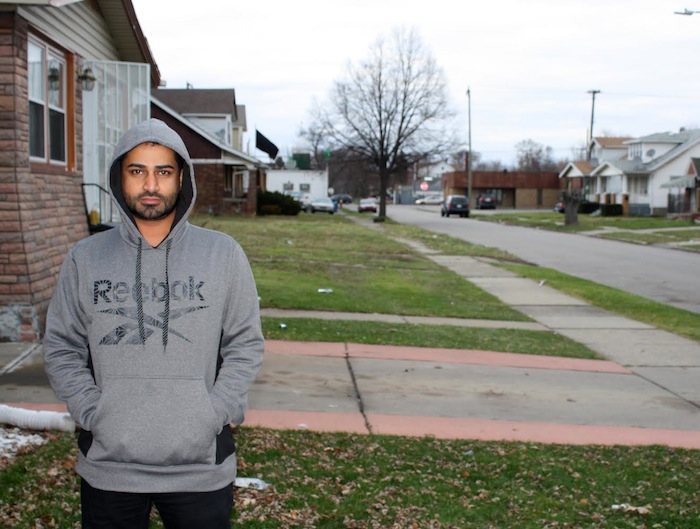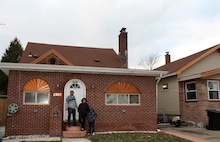Repopulating Detroit: City still welcoming to immigrants and refugees
DETROIT — Zaki Albokhshem, an international student from Saudi Arabia, is studying to be a special education teacher. He has been in Detroit for 10 months, and he already aspires to call the city home.
Albokhshem wants to become a permanent resident. He said opportunities are plentiful in the city, and the large Arab and immigrant communities make him feel like he belongs here.
“What makes Detroit special to me is all the Arabic grocery stores and Islamic centers,” he said. “Everybody treats me well.”
Fahman Amri, Albokhshem’s friend, is already experiencing the success the international student is seeking.
Amri immigrated to the United States from Yemen 15 years ago. He moved to Detroit in 2009 and now owns 14 homes here.
As a handyman, Amri is taking advantage of the Detroit Land Bank auctions. The city is auctioning abandoned properties from a starting price of $1,000 on the condition that the new owner bring the home up to habitable code within six months.
Amri is fixing the houses himself to sell or rent, mostly to other Arab American immigrants. But his investment in Detroit is not only financial; it is also personal. Amri, a father of six, said he hopes his children remain in the city after they grow up.
"This is my home," he said. "I am staying here, not going anywhere."
Iraqi American resident Riyadh Musa, who arrived in the city as a refugee 20 years ago, said a new wave of immigrants from his home country is helping stabilize the Warrendale neighborhood.
“They report anybody who is selling drugs or has a gun; they’re not used to it,” he said.
Detroit lost more than 25 percent of its population over the past 12 years. Fewer than 700,000 residents remain.
Vice President Joe Biden called Detroit a “comeback city” in September. Residents say services are improving. There are more buses and street lights. Downtown businesses are thriving. But the shrinking residential base remains an obstacle to Detroit’s comeback.
City leaders and organizers are aiming to attract newcomers from outside the country to help with repopulation.
Detroit is already home to 36,000 immigrants.
Despite national and state efforts to pause resettlement of Syrian refugees in the country because of safety concerns, Detroit officials say they are still committed to welcoming those fleeing the war.
Steve Tobocman, the director of Global Detroit, said settling immigrants and refugees in Detroit is essential for economic recovery.
"If Detroit is ever going to stabilize its population loss, frankly, it's going to have to get serious about being inclusive and being open and welcoming to immigrants," he said.
Welcoming city
Tobocman said the United States has historically done a great job of accommodating newcomers because of efforts at the local level.
He added that there is a strong network of groups in Detroit to help immigrants and refugees.
He cited as an example Global Detroit, which connects newcomers to about 700 organizations, including nonprofits and business advocacy groups. Tobocman highlighted Global Detroit’s emphasis on granting immigrants access to these resources by tackling the linguistic and cultural barriers.
He said municipal initiatives like the mayor's Immigrant Affairs office and the city council's Immigration Task Force help make Detroit a destination for those moving to the United States.
"Detroit has unparalleled opportunities for growth and for creating a new home," Tobocman said. "There is low cost housing; there are low barriers to becoming business owners. The city can become very navigable. It's also easy to establish a community from people who come from the same country, who speak your language and share your culture and religion."
He added that the large public school system ensures bilingual programs for students.
Tobocman, who is Jewish, moved to Detroit about 20 years ago. He said he was welcomed despite religious and ethnic differences.
He was elected to the state House of Representatives in 2002. In 2008, he was succeeded by Rashida Tlaib, a Muslim Arab American, who was succeeded last year by Stephanie Chang, an Asian American.
Tobocman said this voting pattern is testament to Detroiters' fondness for diversity.
"Not an either-or"
Though he lauded Detroit's inclusiveness, Tobocman acknowledged that some are skeptical of newcomers and demand greater efforts to help existing residents. But he said programs that assist immigrants are available to everyone.
"This is not an either-or equation," he said. "This is an and-equation."
To illustrate his point, Tobocman cited ProsperUS Detroit, a Global Detroit initiative to train and finance entrepreneurs. He said 85 percent of the program’s graduates are African-American Detroiters.
"This isn't about 'We're only funding immigrant businesses or refugee businesses,'" he said. "This is saying that Detroit needs more businesses, more job opportunities, more retail opportunities in its neighborhoods. We want to be a part of working with low-income communities of color to help rebuild the city in a way that will be inclusive and equitable."
The former state representative added that communities’ needs may be different, but addressing the challenges of a certain group does not mean ignoring others’.
He said it is in Detroiters' self-interest to be welcoming, adding that old and new residents share the same goals and challenges.
At a Nov. 29 town hall meeting on the refugee crisis, Wendell Anthony, president of Detroit's NAACP, echoed Tobocman's remarks.
Anthony said being open to refugees does not mean losing sight of the problems in the neighborhoods and that complaining about opportunities for newcomers is divisive.
"There's enough work in America for everybody to be working and for everybody to have access," he said.
Anthony said immigrants and refugees bring skills that help the entire community.
At the same meeting, Nabih Ayad, founder of the Arab American Civil Rights League, said refugees from the Middle East who have settled here are well educated and business oriented.
"Immigrants are what make this country so strong," he said. "They're not a threat to the economy; they boost the economy, especially when you have a community that's entrepreneurial."
According to a report by Fiscal Policy Institute, immigrants in the metro Detroit area are twice as likely to own small businesses as U.S.-born residents.
"It’s not like 'immigrants versus Detroiters' — it’s 'immigrants are Detroiters,'" said Councilwoman Raquel Castañeda-López.
Municipal Efforts
Castañeda-López co-founded the Detroit Immigration Task Force with Councilman André Spivey last year. The initiative supports current and incoming immigrant communities and fosters international relations.
Molding Detroit into a global city is at the center of those efforts, Castañeda-López said.
She said being an inclusive city extends beyond economic development. Housing, uniting longtime residents and newcomers, and advocating for immigrants’ rights are also part of the equation.
Detroit officials say services that help newcomers benefit all residents. The city’s municipal ID program, set to take effect next year, is one example. The identification card will assist those who are unable to obtain a state ID, including some in the African-American, homeless, senior and immigrant communities.
In October, Mayor Mike Duggan appointed Fayrouz Saad to head the city’s Office of Immigrant Affairs, which is intended to be a hub connecting newcomers to city resources.
Saad said her office is working to catalogue resources from the city and from private nonprofit organizations.
Immigrant Affairs collaborates with Motor City Match, which links businesses to funding and real estate opportunities; the Arab American Chamber of Commerce; Detroit Employment Solutions Corporation and ACCESS, among others.
Hachem Ossieran, operations manager for Employment and Training Services in ACCESS’ Detroit office, estimates that refugees and immigrants comprise about 20 percent of his client base.
He said immigrants and refugees do not need assistance indefinitely; they can grow to become job creators.
Anti-immigrant sentiment on the rise
Saad said anti-refugee sentiment, which has become increasingly prevalent over the past few weeks following terrorist attacks in Paris and California, has not affected her office.
"We are still moving forward in our work as we have been," she said.
Duggan, for instance, has reiterated his commitment to resettling 50 refugee families in the city each year for the next three years.
That benchmark is part of an effort to responsibly increase the population, rather than inviting new residents only to build the tax base, Councilwoman Castañeda-López said.
"Although the city could physically absorb thousands of people, in terms of services and infrastructure, we just don’t have the capacity to take that many," she added.
She cited language services as one area that the city needs to improve.
Castañeda-López said the task force is trying to develop a comprehensive re-population plan that involves social, cultural, academic and economic components for all Detroiters.
Tobocman said there are many myths about immigration, which Global Detroit tries to dispel.
"The facts are that immigrants are job-makers, not job-takers; that they are a huge benefit to the neighborhoods in the city of Detroit, as well as across the region.”
See what new members are saying about why they donated to Bridge Michigan:
- “In order for this information to be accurate and unbiased it must be underwritten by its readers, not by special interests.” - Larry S.
- “Not many other media sources report on the topics Bridge does.” - Susan B.
- “Your journalism is outstanding and rare these days.” - Mark S.
If you want to ensure the future of nonpartisan, nonprofit Michigan journalism, please become a member today. You, too, will be asked why you donated and maybe we'll feature your quote next time!


 Zaki Albokhshem, an international students from Saudi Arabia, said he would eventually like to remain in Detroit. (Courtesy photo)
Zaki Albokhshem, an international students from Saudi Arabia, said he would eventually like to remain in Detroit. (Courtesy photo) Fahman Amri with his sons in front of their Detroit home. (Courtesy photo)
Fahman Amri with his sons in front of their Detroit home. (Courtesy photo)